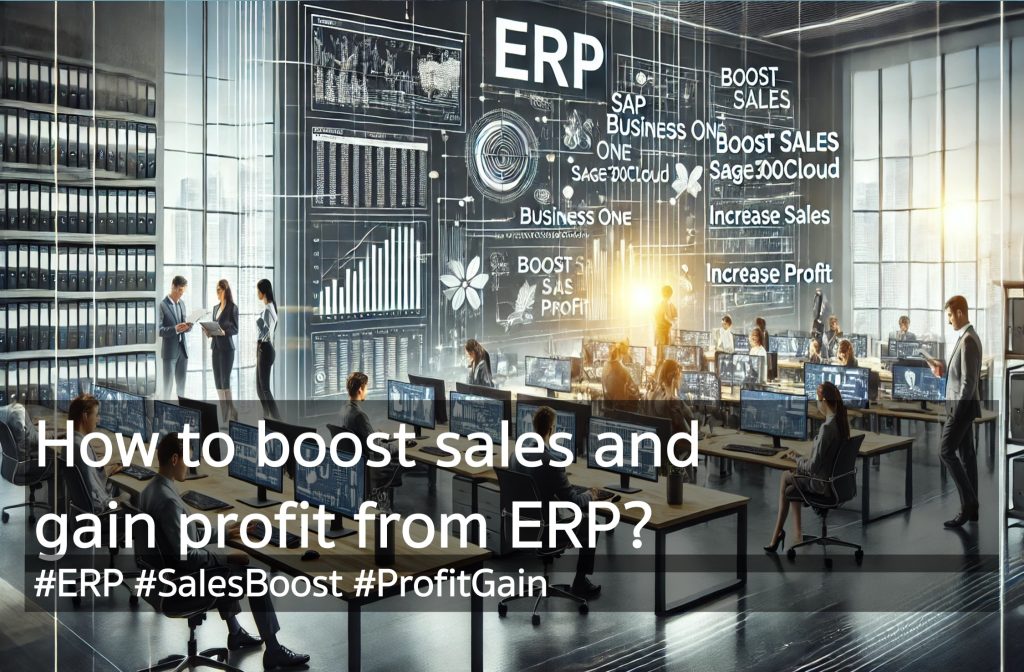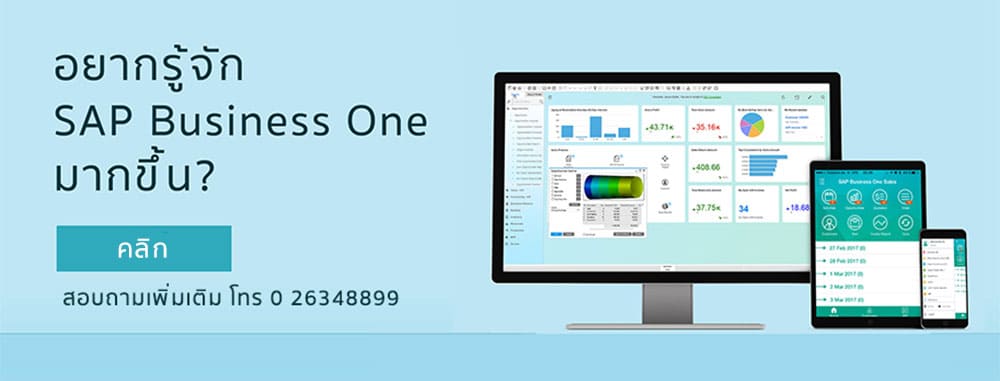How to boost Sales and gain Profit from ERP?
Understanding ERP Systems
Enterprise Resource Planning (ERP) systems are integrated software platforms designed to manage and automate core business processes. These systems are essential for modern businesses as they bring together various functions such as finance, human resources, supply chain management, and customer relations into a single unified system. This integration ensures that information flows seamlessly across all departments, enabling better decision-making and increased operational efficiency.

Historical Background
The evolution of ERP systems began in the 1960s with the development of Material Requirements Planning (MRP) systems. Initially focused on manufacturing and inventory control, these systems laid the groundwork for the comprehensive ERP solutions we see today. In the 1990s, ERP systems expanded beyond manufacturing to include other business processes, transforming into the multifaceted platforms that modern businesses rely on. The advent of cloud computing and mobile technology has further revolutionized ERP systems, making them more accessible and flexible.
Importance in Modern Business
In today’s fast-paced and highly competitive business environment, ERP systems are indispensable. They provide a centralized repository of data, enabling real-time access to information and facilitating informed decision-making. By automating routine tasks and streamlining processes, ERP systems help businesses improve efficiency, reduce costs, and enhance overall productivity. Moreover, the advanced analytics and reporting capabilities of modern ERP systems provide valuable insights that can drive strategic planning and growth.
Benefits of ERP Systems
Improving Efficiency and Productivity
Streamlined Processes
ERP systems streamline business processes by automating repetitive tasks and providing a single system for managing data. This reduces the time and effort required to complete various operations, leading to significant improvements in productivity. For example, an ERP system can automate order processing, inventory management, and financial reporting, allowing employees to focus on more strategic tasks.
Reduced Manual Work
Manual data entry and processing are not only time-consuming but also prone to errors. ERP systems automate these tasks, ensuring accurate data capture and processing. This not only saves time but also reduces the likelihood of costly mistakes. For instance, by automating the invoicing process, an ERP system can eliminate errors and ensure timely billing, improving cash flow and customer satisfaction.
Enhanced Data Accuracy and Reporting
Real-Time Data Access
ERP systems provide real-time access to data across the organization. This means that decision-makers can access up-to-date information whenever they need it, enabling them to make informed decisions quickly. Real-time data access also helps in identifying and addressing issues before they become major problems. For example, a manager can monitor inventory levels in real-time and reorder stock before it runs out, avoiding stockouts and ensuring smooth operations.
Advanced Analytics
Modern ERP systems come with advanced analytics and reporting capabilities. These tools allow businesses to analyze large volumes of data and generate detailed reports on various aspects of their operations. This can provide valuable insights into areas such as sales performance, customer behavior, and operational efficiency, helping businesses identify opportunities for improvement and growth. For instance, an ERP system can analyze sales data to identify trends and forecast future demand, enabling better inventory planning and sales strategies.
Better Inventory Management
Inventory Tracking
Effective inventory management is critical for any business that deals with physical products. ERP systems provide robust inventory tracking capabilities, allowing businesses to monitor stock levels, track product movements, and manage reorder points. This helps ensure that the right products are available at the right time, reducing the risk of stockouts or overstocking. For example, an ERP system can automatically track inventory levels and alert managers when stock falls below a certain threshold, ensuring timely reordering and optimal inventory levels.
Demand Forecasting
ERP systems also offer advanced demand forecasting tools. By analyzing historical sales data and market trends, these tools can predict future demand for products. This allows businesses to plan their inventory more effectively, ensuring they can meet customer demand while minimizing carrying costs. For instance, an ERP system can forecast seasonal demand for products, enabling businesses to adjust their inventory levels accordingly and avoid excess stock or shortages.
Improved Customer Relationship Management (CRM)
Integrated Customer Data
ERP systems integrate CRM functionality, providing a comprehensive view of customer interactions across the organization. This includes everything from sales and marketing to customer service and support. By having all this information in one place, businesses can better understand their customers and tailor their interactions to meet their needs. For example, an ERP system can consolidate customer purchase history, preferences, and feedback, enabling businesses to provide personalized service and build stronger customer relationships.
Personalized Customer Interactions
With detailed customer data at their fingertips, businesses can deliver more personalized interactions. This can range from targeted marketing campaigns to customized product recommendations. Personalization not only improves customer satisfaction but also drives sales and customer loyalty. For instance, an ERP system can segment customers based on their purchase behavior and send personalized offers or promotions, increasing the likelihood of repeat purchases and customer retention.
Boosting Sales with ERP
Sales Automation
Automating Sales Processes
ERP systems can significantly enhance sales performance by automating key sales processes. This includes everything from lead management and opportunity tracking to order processing and invoicing. Automation not only saves time but also ensures accuracy and consistency in sales operations. For example, an ERP system can automate the process of generating sales quotes and invoices, reducing manual errors and speeding up the sales cycle.
Benefits of Sales Automation
Sales automation offers several benefits, including improved efficiency, increased sales productivity, and enhanced customer satisfaction. By automating routine tasks, sales teams can focus on building relationships with customers and closing deals. Additionally, automation ensures that sales processes are standardized and consistent, reducing the risk of errors and improving overall sales performance. For instance, an ERP system can automatically assign leads to sales representatives based on predefined criteria, ensuring timely follow-up and improving lead conversion rates.
Improved Lead Management
Tracking and Managing Leads
Effective lead management is crucial for boosting sales. ERP systems provide robust lead tracking and management capabilities, allowing businesses to capture, track, and nurture leads throughout the sales cycle. This includes capturing leads from various sources, tracking their progress, and managing follow-ups. For example, an ERP system can integrate with a business’s website and CRM system to capture leads from online forms and track their progress through the sales funnel.
Converting Leads into Customers
ERP systems provide tools and insights that help sales teams convert leads into customers. This includes lead scoring, which helps prioritize leads based on their likelihood to convert, and automated follow-up reminders to ensure timely engagement. Additionally, ERP systems provide detailed insights into lead behavior and preferences, enabling sales teams to tailor their interactions and increase the likelihood of conversion. For instance, an ERP system can analyze lead data to identify high-potential leads and provide sales teams with personalized recommendations for engagement.
Enhanced Customer Insights
Analyzing Customer Data
ERP systems provide comprehensive customer data, enabling businesses to analyze customer behavior and preferences. This includes everything from purchase history and contact information to interaction history and feedback. By analyzing this data, businesses can gain valuable insights into customer needs and preferences, enabling them to tailor their sales and marketing strategies. For example, an ERP system can analyze customer purchase history to identify trends and preferences, enabling businesses to offer personalized product recommendations and promotions.
Using Insights for Targeted Marketing
With detailed customer insights, businesses can create targeted marketing campaigns that resonate with their audience. This includes segmenting customers based on their behavior and preferences and delivering personalized messages and offers. Targeted marketing not only improves customer engagement but also drives sales and customer loyalty. For instance, an ERP system can segment customers based on their purchase behavior and send personalized offers or promotions, increasing the likelihood of repeat purchases and customer retention.
Better Sales Forecasting
Accurate Sales Predictions
ERP systems provide advanced sales forecasting tools that help businesses predict future sales based on historical data and market trends. Accurate sales forecasts are essential for effective inventory management, financial planning, and sales strategy development. By analyzing historical sales data, ERP systems can identify trends and patterns, enabling businesses to make informed predictions about future sales. For example, an ERP system can forecast seasonal demand for products, enabling businesses to adjust their inventory levels and sales strategies accordingly.
Aligning Inventory with Sales Forecasts
Accurate sales forecasts help businesses align their inventory levels with anticipated demand. This ensures that businesses can meet customer demand without overstocking or understocking products. By aligning inventory with sales forecasts, businesses can optimize their inventory levels, reduce carrying costs, and improve cash flow. For instance, an ERP system can analyze sales forecasts and generate automated reorder suggestions, ensuring that inventory levels are always aligned with anticipated demand.
Optimized Order Management
Streamlining Order Processing
ERP systems streamline order processing by automating key tasks and providing a centralized system for managing orders. This includes everything from order capture and processing to fulfillment and invoicing. By streamlining order processing, businesses can reduce order fulfillment times, improve accuracy, and enhance customer satisfaction. For example, an ERP system can automate the process of capturing orders from multiple sales channels and generating invoices, ensuring timely and accurate order fulfillment.
Reducing Order Fulfillment Time
Efficient order management is critical for meeting customer expectations and boosting sales. ERP systems provide tools and insights that help businesses reduce order fulfillment times and improve order accuracy. This includes real-time inventory tracking, automated order processing, and integrated shipping and logistics management. For instance, an ERP system can track inventory levels in real-time and automatically route orders to the nearest warehouse for faster fulfillment, reducing order delivery times and improving customer satisfaction.
Gaining Profit with ERP
Cost Reduction
Lowering Operational Costs
ERP systems help businesses reduce operational costs by streamlining processes, automating tasks, and improving efficiency. This includes everything from reducing manual work and eliminating redundancies to optimizing resource allocation and improving inventory management. By lowering operational costs, businesses can improve their profit margins and invest in growth initiatives. For example, an ERP system can automate routine tasks such as data entry and reporting, reducing the need for manual labor and lowering operational costs.
Reducing Waste and Inefficiencies
ERP systems provide tools and insights that help businesses identify and eliminate waste and inefficiencies. This includes analyzing processes to identify bottlenecks, monitoring resource utilization, and implementing continuous improvement initiatives. By reducing waste and inefficiencies, businesses can improve productivity, reduce costs, and increase profitability. For instance, an ERP system can track production processes in real-time and identify areas where resources are being underutilized or wasted, enabling businesses to implement corrective measures and improve efficiency.
Increased Revenue
Identifying New Revenue Streams
ERP systems provide valuable insights that help businesses identify new revenue streams and growth opportunities. This includes analyzing market trends, customer behavior, and sales performance to identify new products, services, or markets to target. By identifying new revenue streams, businesses can diversify their offerings and increase their revenue potential. For example, an ERP system can analyze sales data to identify emerging trends and opportunities for new product development, enabling businesses to capitalize on market demand and increase revenue.
Upselling and Cross-Selling Opportunities
ERP systems provide tools and insights that help businesses identify upselling and cross-selling opportunities. This includes analyzing customer purchase history and behavior to identify complementary products and services to offer. By leveraging upselling and cross-selling opportunities, businesses can increase their average order value and boost revenue. For instance, an ERP system can analyze customer purchase history to identify products that are frequently bought together and recommend these products to customers during the sales process, increasing the likelihood of additional purchases and boosting revenue.
Enhanced Financial Management
Improved Financial Reporting
ERP systems provide advanced financial reporting capabilities that help businesses monitor their financial performance and make informed decisions. This includes real-time access to financial data, automated financial reporting, and advanced analytics. By improving financial reporting, businesses can gain better insights into their financial health and make strategic decisions to improve profitability. For example, an ERP system can generate real-time financial reports that provide detailed insights into revenue, expenses, and profitability, enabling businesses to identify areas for improvement and take corrective action.
Better Budgeting and Planning
ERP systems provide tools and insights that help businesses improve their budgeting and planning processes. This includes real-time access to financial data, advanced budgeting tools, and scenario analysis capabilities. By improving budgeting and planning, businesses can make more informed decisions, optimize resource allocation, and improve financial performance. For instance, an ERP system can analyze historical financial data and generate budget forecasts, enabling businesses to plan their finances more effectively and allocate resources to areas with the highest potential for growth and profitability.
Supply Chain Optimization
Streamlining Supply Chain Operations
ERP systems help businesses optimize their supply chain operations by providing real-time visibility into inventory levels, production processes, and supplier performance. This includes everything from demand forecasting and inventory management to procurement and logistics management. By streamlining supply chain operations, businesses can reduce costs, improve efficiency, and ensure timely delivery of products. For example, an ERP system can provide real-time visibility into inventory levels and production processes, enabling businesses to optimize their supply chain and reduce lead times.
Improving Supplier Relationships
ERP systems provide tools and insights that help businesses improve their supplier relationships. This includes tracking supplier performance, managing supplier contracts, and ensuring timely payments. By improving supplier relationships, businesses can negotiate better terms, reduce costs, and ensure a reliable supply of products. For instance, an ERP system can track supplier performance and provide insights into delivery times, quality, and costs, enabling businesses to identify and address issues and build stronger supplier relationships.
Improved Vendor Management
Better Vendor Relationships
ERP systems provide tools and insights that help businesses manage their vendor relationships more effectively. This includes tracking vendor performance, managing vendor contracts, and ensuring timely payments. By improving vendor relationships, businesses can negotiate better terms, reduce costs, and ensure a reliable supply of products. For example, an ERP system can track vendor performance and provide insights into delivery times, quality, and costs, enabling businesses to identify and address issues and build stronger vendor relationships.
Negotiating Better Terms
ERP systems provide valuable insights that help businesses negotiate better terms with their vendors. This includes analyzing vendor performance, monitoring market trends, and leveraging data to negotiate favorable terms. By negotiating better terms, businesses can reduce costs, improve profitability, and ensure a reliable supply of products. For instance, an ERP system can analyze vendor performance and market trends to provide businesses with the data they need to negotiate better pricing, delivery terms, and payment terms with their vendors.
Conclusion
Recap of the Benefits of ERP
ERP systems offer numerous benefits, including improved efficiency and productivity, enhanced data accuracy and reporting, better inventory management, and improved customer relationship management. By streamlining processes, automating tasks, and providing real-time access to data, ERP systems help businesses boost sales, reduce costs, and increase profitability.
How to Maximize Sales and Profit with ERP
To maximize the benefits of ERP systems, businesses should carefully select the right system, plan and prepare for implementation, and continuously monitor and improve the system. This includes leveraging sales automation, improving lead management, analyzing customer data, and aligning inventory with sales forecasts. By effectively using ERP systems, businesses can boost sales, reduce costs, and increase profitability.
Future Trends in ERP
Emerging Technologies
The future of ERP systems is being shaped by emerging technologies such as artificial intelligence, machine learning, and the Internet of Things (IoT). These technologies are enhancing the capabilities of ERP systems, enabling businesses to gain deeper insights, improve decision-making, and automate more processes. For example, AI-powered analytics can provide predictive insights into sales trends, while IoT-enabled devices can provide real-time data on inventory levels and production processes.
สอบถามเพิ่มเติมเกี่ยวกับ SAP Business One ติดต่อ
บริษัท ซันเด โซลูชันส์ จำกัด
โทร 026348899 อีเมล sales@sundae.co.th
เว็บไซต์ https://www.sundae.co.th/solution/erp/sap-business-one/
- July 29, 2024
- Posted by: sundaeadmin
- Category: Articles-EN


